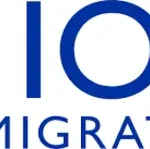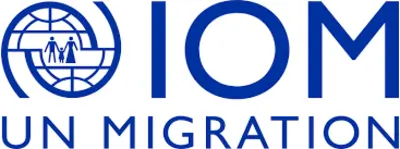
International Organization for Migration
Position Title: Data Analyst (Data for Insight)
Duty Station: Berlin, Germany
Classification: Professional Staff, Grade P3
Type of Appointment: Fixed term, one year with possibility of extension
Estimated Start Date: As soon as possible
Closing Date: 25 January 2024
Established in 1951, IOM is a Related Organization of the United Nations, and as the leading UN agency in the field of migration, works closely with governmental, intergovernmental and non-governmental partners. IOM is dedicated to promoting humane and orderly migration for the benefit of all. It does so by providing services and advice to governments and migrants.
IOM is committed to a diverse and inclusive work environment. Read more about diversity and inclusion at IOM at www.iom.int/diversity.
Applications are welcome from first- and second-tier candidates, particularly qualified female candidates as well as applications from the non-represented member countries of IOM. For all IOM vacancies, applications from qualified and eligible first-tier candidates are considered before those of qualified and eligible second-tier candidates in the selection process.
For the purpose of this vacancy, the following are considered first-tier candidates:
- Internal candidates
- Candidates from the following non-represented member states: Antigua and Barbuda; Barbados; Botswana; Cabo Verde; Comoros; Congo (the); Cook Islands; Dominica; Fiji; Grenada; Guinea-Bissau; Holy See; Iceland; Kiribati; Lao People’s Democratic Republic (the); Madagascar; Marshall Islands; Micronesia (Federated States of); Namibia; Nauru; Palau; Saint Kitts and Nevis; Saint Lucia; Solomon Islands; Suriname; The Bahamas; Tonga; Tuvalu; Uzbekistan; Vanuatu
Second tier candidates include:
All external candidates, except candidates from non-represented member states.
Context:
In a complex and uncertain world, the useful application of data for evidence-based policy and action is needed now more than ever. Whether it be helping displaced people find durable solutions in the face of climate change, to analysis that allows better forecasting of migration trends and preparedness—managing human mobility to contribute to sustainable development requires a data-driven approach.
The International Organization for Migration (IOM) has an abundance of information about human mobility: With offices in almost every country, IOM is trusted by its Member States for deep domain knowledge and field expertise. IOM has strategic partnerships with other United Nations (UN) agencies and stakeholders in the UN Migration Network. It works directly with a wide range of beneficiaries and enjoys a place at the forefront of data protection efforts within the UN system.
IOM established the Global Data Institute (GDI) to harness the power of its data for operations, making meaning of global migration patterns, and providing foresight. The Global Data Institute capitalizes on synergies between its two units–the Displacement Tracking Matrix (DTM) and the Global Migration Data Analysis Center (GMDAC)–and collaborates with a network of regional data specialists to illuminate the global data story of human mobility.
Organizational Setting and Reporting Relationships: The data analyst post is located in GDI’s organizational setting to benefit IOM from extensive analysis of data. The data analyst reports to a data specialist in GDI. The focus of the data analyst post is to generate and communicate data-driven analyses and insights in support of decision-making processes.
The data analyst turns data into information, information into insight and insight into IOM operations pillar actions and decisions. Through a range of data-driven products, the data analyst helps colleagues identify and communicate facts, trends, and patterns along migration corridors to support evidence-based decision-making.
Core Functions / Responsibilities:
Technical
- Locate and define new data analysis process improvement opportunities.
- Identify appropriate data sources for analytics projects.
- Collaborate with data engineers and data scientists to improve data flows, data quality, etc.
- Develop and implement databases, data collection systems, data analytics and other strategies that optimize statistical efficiency and quality.
Support execution of projects
- Support team in translation of organizational needs into analytics and reporting requirements to support decisions, strategies and workflows with data and information.
- Identify, analyze, and interpret trends or patterns, using basic machine learning techniques, statistical methods to identify relevant features and variables in structured and unstructured sources of information and data.
- Contribute to mobilization of resources to respond to regional office and country office data needs.
Support collaboration on data analysis across organization
- Develop and implement various analysis, reporting and quality control capabilities.
Work implies frequent interaction with the following:
Collaborate with data engineers, scientists and other data-focused specialists in the department and across the organization; Establish and maintain relationships with counterparts at headquarters and regional offices. Counterparts in specialized agencies, national governments, civil society, academia, philanthropy and the private sector where appropriate.
Perform such other duties as may be assigned.
Required Qualifications and Experience:
Education
- Master’s Degree in Data Science, Computer Science, Information Management, Statistics, Public Administration, Public Information, Management or a related field from an accredited academic institution with five years of relevant professional experience; or
- University degree in the above fields with seven years of relevant professional experience.
Experience
A minimum of five years of progressively responsible experience in applied analytics, economic analysis, information management, statistics, project management, or related area is required.
The following experience is required:
- Design thinking: Experience using user-centered innovative problem-solving approach including effective problem solving, user research (designing surveys, interviews, and observational studies to collect qualitative and quantitative data for problem solving), creating testing and iterating prototypes of potential solutions.
Skills
The following skill is required:
- Statistical Analysis: Strong grasp of statistical concepts and be able to apply them to various datasets including hypothesis testing, regression analysis, and other advanced statistical techniques to identify patterns, correlations, and trends.
- Data Interpretation: Skill in interpreting economic data to identify trends, patterns, and outliers. This includes understanding the economic significance of data changes.
- Data Mining: Proficiency in data mining techniques to discover valuable patterns and insights in large datasets.
- Strategic Decision Support: Skill in providing data insights to support strategic decision-making which may include data-driven storytelling to convey compelling data insights and solutions.
- Time Series Analysis: Ability to model and forecast time-dependent variables. The following skill is desirable:
- Data Visualization: Proficiency in data visualization tools (e.g., Tableau, Power BI, or Python libraries like Matplotlib and Seaborn) is essential. They should be able to create compelling and informative visualizations that help stakeholders understand complex data.
- Machine Learning: Familiarity with machine learning techniques and algorithms is increasingly important. Data analysts should be able to apply supervised and unsupervised learning methods to solve complex problems and make predictions.
- Data Manipulation: Strong skills in data manipulation using tools like SQL, Pandas, or dplyr. This includes data cleaning, transformation, and integration to prepare data for analysis.
- Big Data Technologies: Familiarity with technologies like Hadoop, Spark, and NoSQL databases for handling and analyzing large datasets.
- Coding Skills: Proficiency in a programming language like Python, R, or other relevant languages for data analysis and scripting, including automating repetitive tasks and creating custom analytical tools.
- Econometrics: Knowledge of econometric techniques and their application to economic data, including regression analysis, time series analysis, and causal inference.
- Domain analysis (policy, labor and/or supply chain, risk analysis): Understanding of labor and/or supply chain analysis for skills, ability to assess the impact of economic policies and regulations on various sectors, industries, or markets that affect migration; risk assessments and scenario analysis to support decision-making.
Languages
IOM’s official languages are English, French, and Spanish. All staff members are required to be fluent in one of the three languages.
For this position, fluency in English is required (oral and written). Working knowledge of another official UN language (Arabic, Chinese, French, Russian, and Spanish) is an advantage.
Proficiency of language(s) required will be specifically evaluated during the selection process, which may include written and/or oral assessments.
Notes
1 Accredited Universities are the ones listed in the UNESCO World Higher Education Database (https://whed.net/home.php).
Required Competencies:
Values – all IOM staff members must abide by and demonstrate these five values:
- Inclusion and respect for diversity: Respects and promotes individual and cultural differences. Encourages diversity and inclusion.
- Integrity and transparency: Maintains high ethical standards and acts in a manner consistent with organizational principles/rules and standards of conduct.
- Professionalism: Demonstrates ability to work in a composed, competent and committed manner and exercises careful judgment in meeting day-to-day challenges.
- Courage: Demonstrates willingness to take a stand on issues of importance.
- Empathy: Shows compassion for others, makes people feel safe, respected and fairly treated.
Core Competencies – behavioural indicators level 2
- Teamwork: Develops and promotes effective collaboration within and across units to achieve shared goals and optimize results.
- Delivering results: Produces and delivers quality results in a service-oriented and timely manner. Is action oriented and committed to achieving agreed outcomes.
- Managing and sharing knowledge: Continuously seeks to learn, share knowledge and innovate.
- Accountability: Takes ownership for achieving the Organization’s priorities and assumes responsibility for own actions and delegated work.
- Communication: Encourages and contributes to clear and open communication. Explains complex matters in an informative, inspiring and motivational way.
Managerial Competencies – behavioural indicators level 2
- Leadership: Provides a clear sense of direction, leads by example and demonstrates the ability to carry out the Organization’s vision. Assists others to realize and develop their leadership and professional potential.
- Empowering others: Creates an enabling environment where staff can contribute their best and develop their potential.
- Building Trust: Promotes shared values and creates an atmosphere of trust and honesty.
- Strategic thinking and vision: Works strategically to realize the Organization’s goals and communicates a clear strategic direction.
- Humility: Leads with humility and shows openness to acknowledging own shortcomings.
IOM’s competency framework can be found at this link.
https://www.iom.int/sites/default/files/about-iom/iom_revised_competency_framework_external.p df
Competencies will be assessed during a competency-based interview.
Other:
Internationally recruited professional staff are required to be mobile.
Any offer made to the candidate in relation to this vacancy notice is subject to funding confirmation.
This selection process may be used to staff similar positions in various duty stations. Recommended candidates endorsed by the Appointments and Postings Board will remain eligible to be appointed in a similar position for a period of 24 months.
The list of NMS countries above includes all IOM Member States which are non-represented in the Professional Category of staff members.
Appointment will be subject to certification that the candidate is medically fit for appointment, accreditation, any residency or visa requirements, and background verification and security clearances. Subject to certain exemptions, vaccination against COVID-19 will in principle be required for individuals hired on or after 15 November 2021. This will be verified as part of the medical clearance process.
Vacancies close at 23:59 local time Geneva, Switzerland on the respective closing date. No late applications will be accepted.
How to apply
Interested candidates are invited to submit their applications HERE, by 25 January 2024 at the latest, referring to this advertisement.
IOM only accepts duly completed applications submitted through the IOM e-Recruitment system. The online tool also allows candidates to track the status of their application.
Only shortlisted candidates will be contacted.
For further information please refer to: www.iom.int/recruitment
Posting period:
From 26.12.2023 to 25.01.2024
No Fees:
IOM does not charge a fee at any stage of its recruitment process (application, interview, processing, training or other fee). IOM does not request any information related to bank accounts.
Requisition: VN 2023 589 Data Analyst (Data for Insight) (P3) Berlin, Germany (58564242) Released Posting: Posting NC58564243 (58564243) Released
Deadline: 25 Jan 2024

